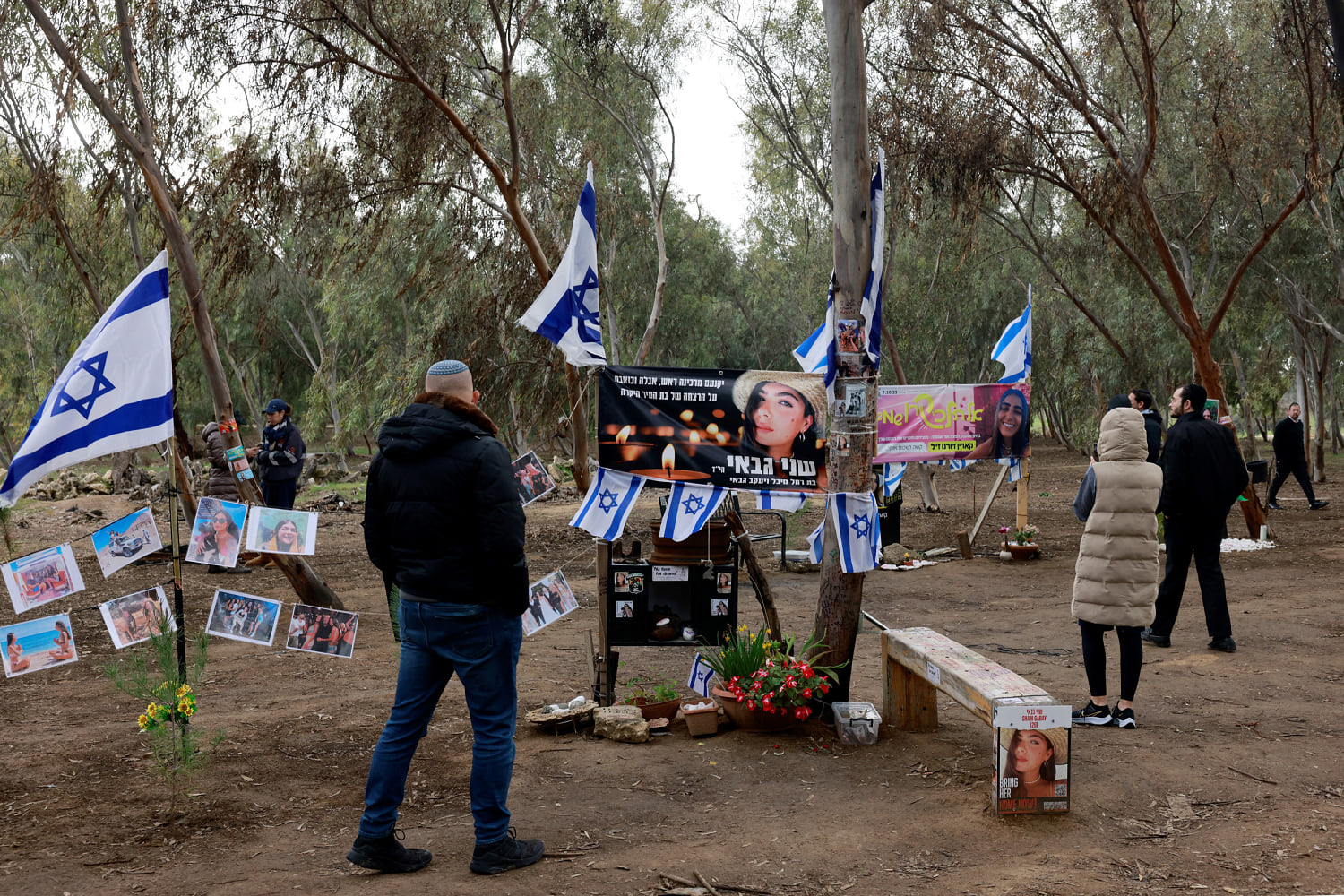Hostage talks continue as Israel rejects Hamas demand for full IDF withdrawal

TEL AVIV — Talks over the release of hostages in Gaza remain at an impasse over Hamas’ demand for a permanent cease-fire, a diplomat with knowledge of the talks told NBC News.
American, Qatari and Egyptian officials continue to push for an agreement that would free an estimated 130 captives believed to remain in Gaza, most likely hidden underground in tunnels or in private homes.
Hamas is demanding the permanent halt of fighting, a complete withdrawal of Israel forces from Gaza and the release of a large number of Palestinian prisoners, including some who carried out the Oct. 7 attack, according to Israeli officials.
A Hamas official said in an interview that the group will not move forward with anything until it has a promise that the war will stop and all Israeli troops will leave Gaza. “This is the core of the discussion,” the Hamas official said.
Israeli officials say their efforts to secure the release of the hostages have never stopped, but they balked last week at Hamas’ demands for a permanent cease-fire, according to a senior Israeli government official.
Prime Minister Benjamin Netanyahu publicly dismissed Hamas’ demands Sunday.
“I reject outright the terms of surrender of Hamas,” Netanyahu said at a news conference. “If we agree to this, we will not be able to guarantee the security of our citizens. We will not be able to return the evacuees safely to their homes, and the next Oct. 7th will only be a matter of time.”
A diplomat from a third country briefed on the talks said some of the mechanics of a potential future exchange have been agreed upon.
“A big portion of the details are agreed. The sticking point is the Israelis don’t want to agree to a permanent cease-fire,” said the diplomat, who asked not to be named. “The deal would include a halt in the fighting of over a month with hostages released in phases in exchange for Palestinian prisoners.”
An Israeli official called that description “nonsense.”
U.S. officials said that they continue to try to move talks forward and that the White House’s Middle East coordinator, Brett McGurk, will travel to Egypt and Qatar this week.
“I wish I could tell you that there was a deal imminent, that we were right on the cusp of one,” National Security Council spokesperson John Kirby said Sunday on MSNBC. “I don’t think that we are right now, but I can tell you we’re working at it every day.”
The Hamas official said the group is “receiving a lot of proposals and ideas from different mediators, mainly the Egyptians and the Qataris,” for the timing and rollout of a potential release of Israeli hostages in exchange for a significant pause in the fighting and the release of Palestinians jailed in Israel.
The mediators’ current proposal envisages releasing the hostages in three phases over 30 days, officials said. The first phase would involve the remaining civilian hostages, the second would include female soldiers of the Israel Defense Forces and the bodies of hostages who have died in Gaza, and the third would include male hostages, including IDF soldiers. Palestinian prisoners would be released in exchange for each group of Israeli hostages.
Gershon Baskin, an Israeli who has acted as a mediator with Hamas for decades, said he has been coordinating with the group through an intermediary in London. Baskin said some Hamas officials want all Palestinian prisoners jailed by Israel to be released, a number estimated at 10,000, suggesting that Hamas’ leadership may not be entirely united as it negotiates.
More than 100 of those 10,000 prisoners were involved in the Oct. 7 Hamas terrorist attack, according to Israeli officials. Around 5,000 Palestinians have been arrested since Oct. 7 in the West Bank, where support for Hamas has surged in the wake of the attack.
The talks to release the hostages and secure a cease-fire are part of a diplomatic effort to create a framework for regional stability, involve Arab countries in the rebuilding of Gaza, reach a defense treaty between the U.S. and Saudi Arabia and establish a pathway to Palestinian sovereignty, according to multiple people familiar with the talks.
The diplomat briefed on the discussions said the talks about the “day after the war” are happening on a separate track from a hostage deal.
The Hamas official said the group hopes to play a role in governing Gaza after the cease-fire it is demanding. “We are talking about the forming of a unity technocratic government with a national reference to supervise the rebuilding process, the unification of the Palestinian institutions and to prepare for elections,” he said in a WhatsApp voice message Sunday.
The idea of rewarding Palestinian in the wake of the brutal Oct. 7 attack is unpalatable to the vast majority of Israelis,…
Read More: Hostage talks continue as Israel rejects Hamas demand for full IDF withdrawal

